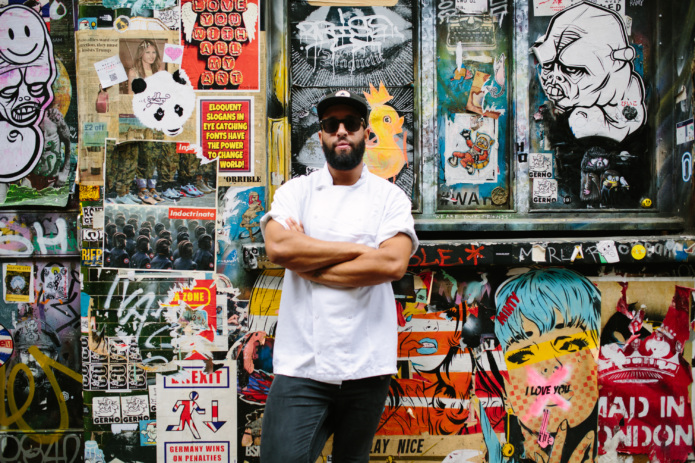Legare
Tower Bridge
Close

During lockdown, the writer and activist Riaz Phillips noticed that many of London’s immigrant communities had turned to the comfort food of their heritage as a means to reconnect to their backgrounds. At the same time, the government’s official report that BAME communities were disproportionately impacted by the effects of COVID-19 led Phillips to conceive, produce, and execute Community Comfort, a digital recipe book of over 100 dishes sourced from some of the best cooks, chefs, and food writers of colour from across the UK.
Recipes were donated by over 100 contributors that include Emeka Frederick of Nigerian tapas restaurant Chuku’s, James Cochran of 12:51 and Around The Cluck, Puff Bakery’s Ravneet Gill, Missy Flynn of Rita’s Dining, and the Rangoon Sisters Emily and Amy Chung. Available to download for a minimum contribution of £10, all proceeds are being donated to the Majonzi COVID-19 Bereavement Fund in collaboration with the Ubele Initiative. Set up to support minority ethnic communities disproportionately affected by COVID-19, the fund was created by Windrush campaigner, social commentator and cultural historian Patrick Vernon.
“For us as migrants or children of migrants, food is one of the ways that many of our communities unite, and is one of the primary ways we can connect and then display our culture to a wider community. This is why it’s important that our voices are given the chance to represent our own culture in an authentic way,” Phillips explains.

As Phillips himself has noted, the restaurant business has been historically challenging for minorities and specifically Black people, with representation and media coverage typically confined to a few figures at any given moment. A project like Community Comfort — which allows contributors to freely express seldom-seen recipes through the lens of their own heritage — celebrates a sample of said community’s depth and breadth of talent.
With that, we spoke to several of the book’s contributors to understand: What does a book like Community Comfort mean to them — and what steps can be taken to offer better representation for minority communities in the restaurant industry?
A book like Community Comfort is a beautiful reminder that there is more that unites us than divides us. Food can tell us a lot about history from a range of perspectives, and this book is a great demonstration of the many ingredients we share and love, yet use in our own unique and exciting ways.
As the hospitality industry is heavily influenced by French and other European cooking styles and standards, more education needs to be done to understand the cooking methods and practices of other cultures so that they can hold the same space in the food world with the respect they deserve.
For those in positions of influence within the industry — such as recruiters, managers, lecturers, media — to look at individuals solely based on their talent, creativity and skill, this will organically create more diversity within the industry which is reflective of the diaspora communities who live in this country and will allow those deserving of these opportunities to benefit, irrelevant of where they are from.
Community Comfort means the home cooking of the immigrant diaspora of the UK that I grew up eating — coming back from school, sitting with the family, and eating together. It’s a cultural link to the food of our historical roots, and a way to preserve that cultural link through nostalgic dishes that remind us of those moments.
Like any other industry, we have to start moving in a direction where people of colour from minority backgrounds are pushed in the media and PR as beautiful, talented, hard working, and entrepreneurial. We shouldn’t be spoken of as token examples of success here and there, but we should be publicised as much as our white counterparts, on equal merit, for doing the same jobs.
To see so much talent in one place is a feat, and just flicking through the recipes, you can see the breadth of skill on show that is hidden within these communities because it’s just part and parcel of the food culture not necessarily exalted like European cooking practices. Even the dishes that are typically un-cookbook — say, my recipe for fried chicken inspired by South London’s chicken shops. It’s not done out of irony; these spaces and dishes mean much different things outside of the usual food media space. It means a lot to recognise those stories when I’m reading through and see my experience too.
I think giving air time to projects like this, and making sure all panels are reflective of who they are supposedly representing and not having one example of BAME as a tick box exercise, is important. Media being active in their search for something new, or rather relaying information on something not talked about widely before as hardly any of it is new, is a responsibility of the media too.
At a time when the world feels so tense and unstable, it was great to be part of a project with the sole purpose of inclusion and community support.
In terms of offering better representation, I think it starts with media coverage and inclusion. We have first-hand experience on how much a positive article or review impacts a business, so coverage of a wider range of food businesses is definitely the way forward. I think the Community Comfort book is a great example of a way to voice and represent minority communities in mainstream media, because it’s a project started by Riaz, a person from the community and for the community.
That’s how representation happens, by giving minority voices a chance to represent ourselves. Media coverage of POC’s businesses and projects that are representative of their culture creates an interest in the general public which leads to further education, value and respect for those cultures and food. It’s a long process of changing and re-educating an entire industry and system but leading that change through food seems achievable — food is such an exciting part of life, and it’s definitely a way to bring people and ideas together.
David Paw is Resy’s international editor. Follow him on Instagram. Follow @Resy, too.